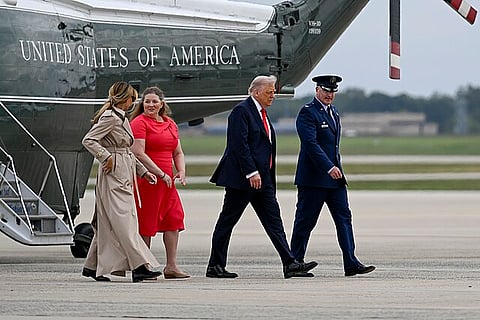

A federal judge has dismissed President Donald Trump's $15 billion defamation lawsuit against The New York Times, describing the complaint as "improper and impermissible" due to its excessive length and inflammatory language. District Judge Steven Merryday, appointed by former President George H.W. Bush, issued the ruling on September 19, 2025, giving Trump's legal team 28 days to refile an amended complaint that adheres to federal procedural rules. The judge emphasized that a lawsuit should not serve as a platform for "vituperation and invective" or a "megaphone for public relations," noting that the original 85-page document was filled with repetitive praise for Trump and tangential arguments.
Judge's Critique
Judge Merryday's ruling highlighted violations of Rule 8(a) of the Federal Rules of Civil Procedure, which requires complaints to be a "short, plain, direct statement of allegations of fact." The lawsuit, which accused The New York Times and publisher Penguin Random House of defamation, consumed 85 pages but only detailed its two core counts in the final pages. Merryday characterized the document as a "tedious and burdensome aggregation of prospective evidence" and "florid allegations" that strayed far beyond legal requirements. He mandated that any refiled complaint must not exceed 40 pages and must focus solely on relevant legal claims.
Trump's Allegations
The lawsuit targeted The New York Times, four of its reporters, and Penguin Random House, alleging a "decades-long pattern" of defamatory coverage aimed at damaging Trump's reputation. It specifically cited articles and a book titled Lucky Loser: How Donald Trump Squandered His Father’s Fortune and Created the Illusion of Success, which Trump claimed contained "repugnant distortions and fabrications." The Times dismissed the lawsuit as having "no merit" and an attempt to stifle independent journalism, vowing to continue its reporting without fear of intimidation.
Trump's Legal Campaigns
This lawsuit is part of Trump's broader pattern of legal actions against media outlets. Since returning to the White House, he has filed high-profile defamation cases against ABC, Paramount, and The Wall Street Journal, securing settlements totaling millions of dollars for his presidential library fund. These settlements, including $15 million from ABC and $16 million from Paramount, have been criticized as efforts by media companies to avoid prolonged litigation and maintain access to the administration. The case against Rupert Murdoch and The Wall Street Journal over reporting on Jeffrey Epstein remains ongoing.
Press Freedom
Legal experts have questioned the validity of Trump's defamation claims, noting the high bar for public figures to prove actual malice under U.S. law. Judge Merryday's ruling did not address the merits of the case but reinforced that courts are not venues for political grievances. The Times and other media advocates have framed the lawsuit as an attack on First Amendment protections, emphasizing the importance of shielding journalists from retaliatory litigation. The outcome of any refiled complaint could set significant precedents for how defamation cases involving public figures are handled in the future.